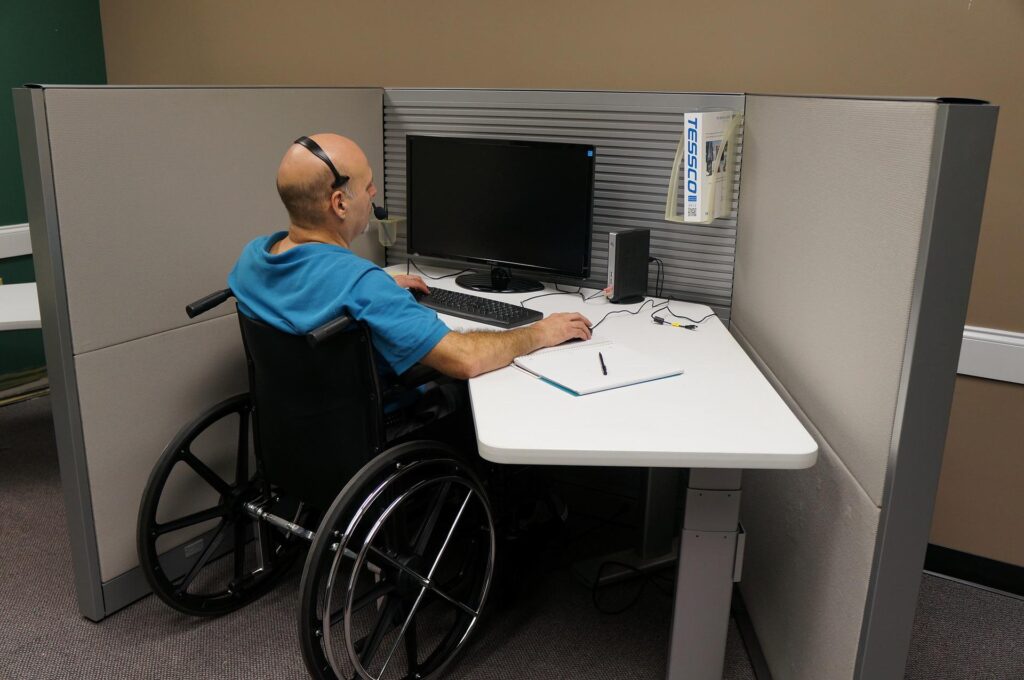TIPS TO CREATING AN INCLUSIVE WORKPLACE | Govloop
This article originally appeared HERE on Govloop.com
Large federal programs that reserve jobs for people with significant disabilities are great opportunities for companies. Many of these contracts have a low threshold for participation and great compensation. Still, many people with disabilities are finding it tough to secure meaningful employment—even in a short-handed job market. What could be the problem?
Barriers for Applicants with Disabilities
People with disabilities often face barriers to employment, and the federal government has responded with programs to help them get jobs. One of these programs is AbilityOne, which sets aside certain contracts for businesses that employ people with disabilities. The Americans with Disabilities Act (ADA) also requires all employers to make reasonable accommodations for employees.
Despite these efforts, the employment rate for people with disabilities is still low. Only 19.1% of disabled people in the U.S. were employed in 2021, according to a recent Bureau of Labor Statistics report.
Misguided concerns may be to blame. “I believe there is still a huge scarlet letter, so to speak, on individuals with disabilities,” states Tina Tyco, project manager for Bona Fide Conglomerate, a non-profit maintenance company that primarily employs people with disabilities in the AbilityOne program. “They might think they are not as productive, they are lazy, they don’t show initiative, they will sue me.”
As a result of these negative ideas, people with disabilities often have a hard time even being considered for a position. What can help companies avoid unintentional discrimination? Conducting a disability assessment could help you develop a clear picture of job duties and the baseline abilities you really need from a candidate.
How to Conduct a Disability Assessment for Your Hiring Process
The ADA requires employers to provide reasonable accommodations to workers with disabilities. However, many employers are unsure how to assess their hiring and workplace environments. Here are some tips on how to conduct a disability assessment:
- Determine the essential functions of the job. Essential functions are the tasks that are critical to the job and cannot be removed or modified.
- Identify any potential accommodations that would allow an individual with a disability to perform the essential job functions.
- Choose an accommodation that is effective and efficient for you, and gives the individual the best opportunity to succeed.
- Be sure to document the accommodation in writing and keep it on file in case it’s needed in the future.
By following these tips, you can ensure that you’re prepared to offer reasonable accommodations for disabled employees and ensure your hiring process is fair and effective.
Benefits to Accommodating Employees with Disabilities
There are many benefits for businesses who are able to accommodate an employee with a disability. Businesses may be able to take advantage of tax incentives, like the federal Work Opportunity Tax Credit, or the $5000 Disabled Access Tax Credit for expenses related to providing access to people with disabilities.
But an unexpected benefit is that accommodating an employee with a disability often improves morale and productivity within the workplace.
“Slow and steady wins the race is almost always the best way. And since their job is a source of pride for them, knowing they are working just like anyone else—that makes them feel empowered,” Tyco notes.
Overcoming Common Complaints from Workers with Disabilities
One common complaint from workers with disabilities is that their employers don’t accommodate their needs. Under the ADA, employers must provide reasonable accommodations for disabled workers, unless doing so would create an undue hardship for the employer.
So what are some common accommodations that employers can provide? Here are a few examples:
- Flexible work schedules
- Modified equipment or furniture
- Quiet workspaces for employees who need it
- Accessible training materials for employees with hearing or vision impairments
Reasonable accommodations should be just that, reasonable for both parties. But if employers can create a more inclusive workplace for all their staff, they can help break down common and unnecessary barriers.
Government Contracting and Disability Accommodation: a Win-Win?
Discrimination against people with disabilities in government contracting not only hurts disabled individuals and their families, but also deprives companies of valuable skills and talents. “My staff show up every day on time, if not early,” Tyco says. “They are dressed well, smile and are always eager to help when needed. During this pandemic era, I have seen businesses need to close or cut hours of operation because they cannot get people to come back to work. My staff have shown up every day for the last 2.5 years.”
The bottom line is that accommodating the needs of qualified individuals with disabilities is not only the right thing to do, it makes good business sense.

